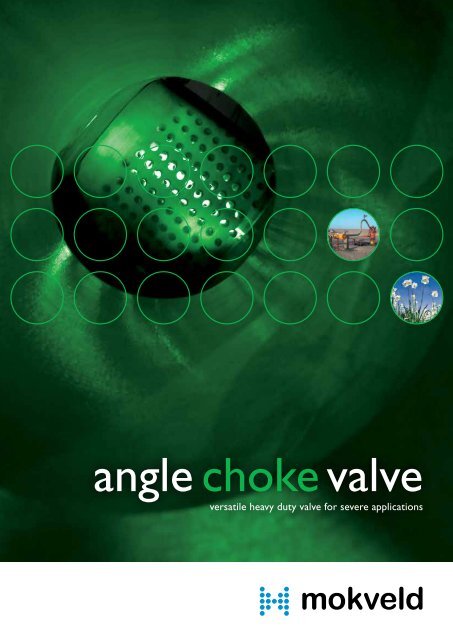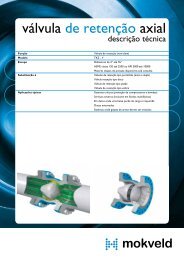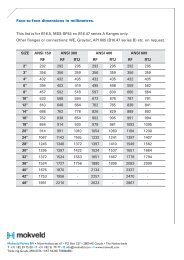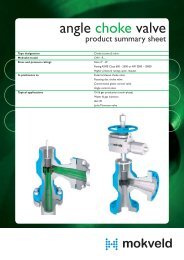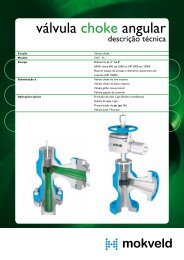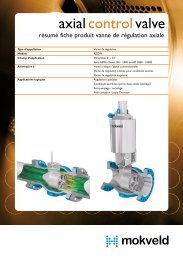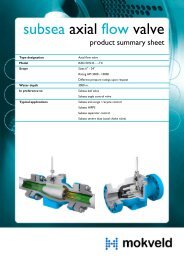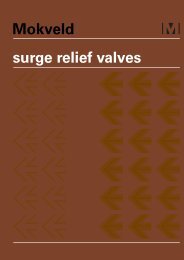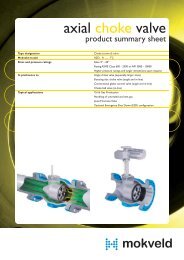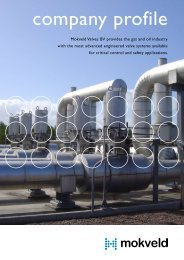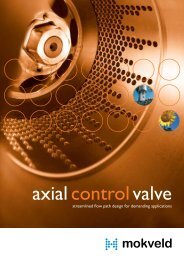You also want an ePaper? Increase the reach of your titles
YUMPU automatically turns print PDFs into web optimized ePapers that Google loves.
angle choke valve<br />
versatile heavy duty valve for severe applications
Innovate to meet<br />
The early days Mokveld was founded in 1922 in Gouda in The Netherlands, as a small<br />
machine repair shop. In the mid-fifties we started making valves, a development which accelerated when<br />
the Nederlandse Aardolie Maatschappij B.V. (joint venture between Shell and ExxonMobil) discovered the<br />
Groningen gas field in 1959. Mokveld started delivering valves for the production of the billions of cubic<br />
meters of gas and over the years was challenged to respond to constant changes with respect to safety,<br />
noise and emissions. By adapting and responding efficiently to the changes of the gas and oil industry our<br />
organisation has gained an excellent reputation as an international supplier of quality valve products.<br />
2
industry demands<br />
Industry challenges<br />
Mokveld is committed to contribute to safe, reliable and sustainable development of the world’s energy and water<br />
resources. Our track record of satisfied customers shows our capability for selecting control solutions, designing<br />
safety systems and managing projects successfully. The integrated choke valve systems described in this brochure<br />
will help to meet your industry and project challenges.<br />
Worldwide experience<br />
Mokveld has extensive experience in designing and manufacturing valves for the gas and oil industry worldwide.<br />
The product portfolio comprises a wide range of valve products, tailor-made to application and customer specifications;<br />
control products<br />
angle choke valves<br />
axial choke valves<br />
axial control valves<br />
safety products<br />
axial on-off valves (for HIPPS)<br />
axial surge-relief valves<br />
axial check valves<br />
In addition a full range of pneumatic and hydraulic actuators with tailored control arrangements are available for<br />
accurate control and reliable operation of your production.<br />
Successful innovation<br />
Regular contact with end-users and our familiarity with a wide variety of applications provide us with all the elements<br />
required for innovation. Recently we have engineered and successfully applied novel trim designs, subsea check<br />
valves and a new actuator line. In cooperation with our customers we have developed a subsea control valve which<br />
further enhanced our knowledge about sealing technology. Mokveld has extensive expertise in the field of material<br />
selection and flow management. This expertise delivers new choke valve technology. A full-scale sand erosion test<br />
of the newly developed choke valve has confirmed a significant improvement in erosion resistance.<br />
Mokveld headquarters<br />
The headquarters and high-tech production<br />
facilities are located in Gouda, The Netherlands<br />
(area 14.000 m 2 or 150.000 ft 2 )<br />
Full-scale erosion testing<br />
Full-scale sand erosion testing of newly<br />
developed choke at Advantica Flow Centre (UK)<br />
through third party Det Norske Veritas (DNV).<br />
Fire-safe testing<br />
Upon request choke valves can be supplied<br />
with fire-safe certification. This illustrates<br />
Mokveld’s intense focus on safety.<br />
3
Realizing<br />
Choke valve selection is often based on early life production process data<br />
and capital expenditure (valve price). However, choke valves are critical<br />
elements in production facilities. Malfunction or failure of a choke valve<br />
can seriously affect safety, the environment and production rates. Valve<br />
selection should be based on sound technical and economic arguments<br />
and long-term perspectives. Mokveld’s angle choke valves have a proven<br />
reliability in terms of performance and will reduce costly maintenance<br />
and production loss.<br />
4
long-term benefits<br />
.<br />
World-class valves based on new technology<br />
Step changes in valve design<br />
In the 1970s Mokveld was challenged to produce an angle choke valve, and pioneered piston-in-cage control<br />
valve technology for angle chokes. The ‘cage-guided-piston’ choke proved a major improvement in durability and<br />
controllability compared to the conventional ‘needle-in-seat’ choke design. Our ‘external sleeve’ choke was launched<br />
in 1982, however, we learned that for severe service the cage-guided-piston principle offered better possibilities.<br />
This cage-guided-piston design became the foundation for consecutive Mokveld choke generations that served as a<br />
benchmark of availability for the choke valve industry.<br />
The newest generation<br />
Based on its growing expertise of materials and flow patterns, and in close cooperation with customers and thirdparty<br />
organizations, Mokveld continued to improve its angle choke valve designs using the Total Velocity Management ®<br />
(TVM) design concept and advanced tools such as Finite Element Analyses and Computational Fluid Dynamics. A new<br />
generation choke valve, the TVM angle choke valve, is the result. Full-scale sand erosion tests confirmed a significant<br />
improvement in erosion resistance. The erosion of this new angle choke valve was reduced by factor 4 compared to<br />
conventional designs.<br />
Over a period of 30 years Mokveld’s angle choke valves have exceeded 100 000 cumulative years of operational<br />
time in severe duty applications. We are proud to be recognized as the worldwide leading supplier of choke valves.<br />
The company is confident that the Mokveld choke valve will serve as an industry benchmark for many years to come<br />
and will be the valve type of choice for companies that value safety and production availability.<br />
4 1 ⁄ 16 ˝ / API 5000 Angle Choke Valve<br />
Application : Hydro Carbon Production<br />
3˝ / API 15 000 Angle Choke Valve<br />
Application : Hydro Carbon Production<br />
8˝ / ASME 1500 Angle Choke Valve<br />
Application : Water Injection Dump<br />
Challenge : High H 2<br />
S content<br />
Challenge : Low noise and erosion resistance<br />
Challenge<br />
: Avoid cavitation<br />
Location : Harweel (Oman, 2006)<br />
Location : Dina (China 2008)<br />
Location : Sirri (Iran, 2004)<br />
5
Total Velocity Management ®<br />
Availability<br />
Improved flow<br />
management avoids vibration<br />
and reduces erosion by a<br />
factor 4. This significantly<br />
maximizes production<br />
availability.<br />
Operational<br />
benefits<br />
Accurate<br />
control<br />
Static and dynamic forces on<br />
the control element (piston)<br />
are minimized. Accurate<br />
control - also with<br />
minimum opening -<br />
is achieved.<br />
High<br />
turndown<br />
High capacity and<br />
accurate control features<br />
make the valve appropriate<br />
for both start-up and well<br />
depletion production<br />
scenarios.<br />
Safety<br />
benefits<br />
FloSafe ® bean<br />
The choke can be<br />
supplied with a FloSafe ®<br />
bean to provide ultimate<br />
protection against relief<br />
system overload.<br />
Safety bonnet<br />
The threaded bonnet<br />
prevents the well-known<br />
‘closed-in pressure risk’ with<br />
disassembly, associated with<br />
bolted bonnet chokes.<br />
Fire-safe<br />
To provide additional<br />
protection for assets and<br />
operators, all choke valves<br />
can be supplied with<br />
fire-safe certification.<br />
6
key to availability<br />
Easy<br />
maintenance<br />
With angle transmission<br />
installed, the choke valve can be<br />
maintained without removal of<br />
actuator and instrument connections.<br />
This will also offer<br />
more flexibility in installation<br />
layout.<br />
Significant<br />
cost savings<br />
Reliability<br />
Total Velocity Management ®<br />
is vital for reliable choke valve<br />
operation. Increased reliability<br />
reduces the total cost of<br />
ownership and minimizes<br />
unplanned process<br />
downtime.<br />
Compact<br />
As a result of the low<br />
actuation force requirement,<br />
small actuators can be used;<br />
combined with a compact<br />
valve body design this minimizes<br />
the installation’s<br />
footprint.<br />
7
Increased reliability and<br />
Mokveld’s Total Velocity Management ® concept<br />
Local high fluid velocities due to preferential flow paths are the prime source<br />
of noise, erosion, vibration and malfunction resulting from unbalanced forces.<br />
Prevention is better than a cure. Mokveld’s Total Velocity Management ®<br />
concept is an intelligent valve design that carefully manages fluid velocity in all<br />
areas of the valve (trim and body) by smart engineering of the relevant valve<br />
parts. Source treatment by Total Velocity Management ® is key to reliability.<br />
Improved flow path design<br />
The basic rules to minimize erosion in valves are:<br />
minimize the velocity of the medium<br />
minimize abrupt changes in flow direction<br />
select erosion resistant materials<br />
Although any angle type choke valve is inherently more susceptible to<br />
erosion than an axial type, Mokveld has redesigned the entire flow path to<br />
minimize this adverse effect. Clever engineering of the flow and velocity<br />
patterns in the gallery, trim and outlet area can reduce erosion significantly.<br />
As a result of many years of research, testing and 3D CFD studies, we<br />
managed to eliminate turbulent flow in the gallery area, evenly distribute<br />
the flow through the cage (full surround flow path) and to reduce velocity<br />
through the bean. This ensures reliable valve performance as vibration<br />
and unbalanced forces are avoided and erosion is reduced by a factor 4.<br />
With a minimum of turbulence and change in the fluid velocity, the energy<br />
conversion in the valve body itself is limited. The pressure drop is mainly<br />
over the trim, which has been specifically designed to withstand high<br />
erosional velocities. Our standard design includes a cage, piston and bean<br />
of solid high-quality Tungsten Carbide with the grade selected depending<br />
on the service.<br />
Top view<br />
Top view<br />
Gallery / Cage<br />
Gallery / Cage<br />
Conventional choke valve<br />
Preferential flow through cage facing leads to<br />
unbalanced trim forces and excessive erosion<br />
of valve body and trim parts.<br />
TVM choke valve<br />
The Total Velocity Management ® concept<br />
reduces choke erosion by factor 4. This results<br />
in increased production availability.<br />
TVM choke valve<br />
The angled shape of a choke valve causes an<br />
abrupt change in flow direction. TVM eliminates<br />
erosion damage caused by preferential flow.<br />
8
educed operational costs<br />
Historic development of Mokveld choke valves<br />
2 nd Mokveld generation<br />
External sleeve choke valve<br />
4 th Mokveld generation<br />
Cage-guided-piston choke valve<br />
Latest Mokveld generation<br />
TVM angle choke valve<br />
Our cage-guided-piston design - your preferred choice<br />
To improve erosion resistance reputable choke suppliers use solid Tungsten Carbide for the throttling parts. Because<br />
of the brittleness of this material, the cage needs to be firmly secured in the valve body. For reliability reasons Mokveld<br />
has selected the cage-guided-piston design for its choke valve designs. The advantage of this design is that the cage<br />
can be firmly secured in the valve body and the piston can be guided over the full length of the stroke. This results in<br />
minimum sensitivity of the cage and piston to: flow-induced side loads<br />
vibration-induced fatigue and<br />
impact by particles<br />
In addition, the flow area around the cage (the gallery area) is wide, which results in low velocities effectively reducing<br />
erosion of the cage and choke body.<br />
High rangeability<br />
Today’s gas field developments operate at high wellhead pressures and often process aggressive fluids with entrained<br />
sand and other solid particles. For start-up scenarios at high pressure, the capacity requirement is relatively low.<br />
However, at the well depletion stage the capacity through the valve is generally high. Mokveld’s cage-guided-piston<br />
choke can handle high and low pressures as well as low and high flow rates, without the need to replace the trim.<br />
In closed position the shut-off is class V.<br />
9
Setting the tone<br />
Safety first<br />
Fluids that include sand and other particles at conditions with high pressures,<br />
temperatures and velocities mean that the performance of a choke valve<br />
is critical. Can safety be assured for personnel, the installation and the<br />
environment under all circumstances?<br />
Safety bonnet<br />
According to API 6A / ISO 10423 (§ 10.9.3.6) chokes shall be designed<br />
to vent trapped pressure prior to releasing the body-to-bonnet connector.<br />
The Mokveld safety bonnet is an intrinsically safe solution which offers<br />
a high level of security compared to the conventional bolted bonnet design.<br />
When maintenance is required with a bolted bonnet choke, the engineer<br />
can easily forget to open the relief and vent trapped pressure. After removal<br />
of a few bolts the remaining bolts may not be strong enough to contain the<br />
pressure behind the bonnet; the bolts will break and the bonnet is ejected<br />
with dangerous force potentially causing fatal injuries.<br />
The Mokveld safety bonnet is screwed into the choke body by means<br />
of self-locking thread. Therefore, when pressure is trapped it will not be<br />
possible to unscrew the bonnet. At low residual pressure the engineer<br />
may succeed in turning the bonnet and the design will automatically start<br />
venting at 15% opening. The remaining thread is more than sufficient<br />
to contain the full rated pressure hence preventing accidents.<br />
Low emission and fire safe<br />
The high-integrity valve body is an integral casting or forging, without<br />
any welds or bolted parts and no leak paths to the atmosphere other than<br />
the bonnet/stem assembly. The excellent sealing system ensures compliance<br />
with all international standards for fugitive emission. Optionally the choke<br />
can be supplied with leak detection of the dynamic stem seal. For certified<br />
fire-safe execution, a redundant stem seal is provided.<br />
Mokveld safety bonnet<br />
The bonnet is screwed into the body by means<br />
of self-locking thread. Any residual pressure<br />
will automatically be vented at 15% opening.<br />
10
for safety and control<br />
FloSafe ® bean<br />
There are three material properties that are critical to the longevity of the trim: resistance against erosion, corrosion<br />
and impact. The Tungsten Carbide grade used in Mokveld choke valve trims proves to be among the top performers<br />
with regard to these aspects, and will therefore give outstanding performance.<br />
Sometimes, a choke valve is considered as a safety device to prevent overload of the relief system. In that case it<br />
is of paramount importance that the valve capacity does not exceed predefined limits under any circumstances.<br />
Although unlikely, the worst scenario would be a collapse of the trim upon impact of parts. One solution that<br />
Mokveld offers, is to improve the impact resistance by adding a fortifying steel outer cage. This, however, is not an<br />
ultimately safe solution as the steel fortification cage is subject to erosion which will reduce its functionality over time.<br />
The optimum solution is to separate the choke valve’s control and safety function. Following an evaluation of your<br />
process conditions Mokveld choke valves can be equipped with a FloSafe ® bean to provide ultimate protection against<br />
relief system overload. The custommade FloSafe ® bean is capacity balanced with the cage and the available flaring<br />
capacity. During normal operation the bean does not influence the choke control characteristic, but in case of cage<br />
collapse the FloSafe ® bean will limit the flow rate to an acceptable flaring rate.<br />
Custom designed trim<br />
Standard and custom designed trims can be selected for various applications. The all-round RQX trim is most<br />
commonly used. This single-stage, multi-hole trim offers accurate control and high noise abatement. The holes are<br />
of a sufficiently large size to avoid clogging at normal production applications. The RQX trim is suitable for a wide<br />
operating envelope, which diminishes the need for replacement at a later stage. For more extreme conditions, a<br />
selection of multi-stage, labyrinth-style cages is available offering very high noise abatement and/or high anti-cavitation<br />
coefficients. It should be noted, however, that in a normal production environment labyrinth-style cages work as a<br />
strainer and may cause the choke to clog. During dirty well clean-up service a RCU large hole trim can be installed.<br />
At well depletion stage a RDS cage will almost eliminate pressure loss over the choke.<br />
All trims can be provided with reduced capacity and linear or equal% control characteristics. Together with the long<br />
valve stroke this is the optimum recipe for accurate control of your process.<br />
Selection of single-stage trim<br />
The all-round RQX trim is suitable for high to<br />
low pressure drops offering high capacity and<br />
considerable noise abatement.<br />
Selection of multi-stage trims<br />
Multi-stage trims are designed for high noise<br />
abatement or to avoid cavitation at high<br />
pressure gas, two-phase or liquid applications.<br />
Ultimate safety choke<br />
This choke has a FloSafe ® bean to provide<br />
ultimate protection against system overload and<br />
can be provided with a steel fortification cage.<br />
11
Small actuators for reliable<br />
balanced pressure force<br />
evenly distributed flow for<br />
minimal dynamic force<br />
Low actuation force and small actuators<br />
High static and dynamic valve forces may lead to operational problems<br />
and require powerful and large size actuators. As a result of the<br />
evenly distributed flow through the cage, the dynamic forces on piston<br />
operation are relatively small. Mokveld choke valves are fitted with<br />
a pressure-balanced piston assembly. The operating thrust/torque is<br />
virtually independent of the differential pressure across the valve.<br />
Therefore, manually operated chokes do not require intermediate<br />
gear boxes and for automatic operation the required actuators are<br />
small and light.<br />
12
and accurate control<br />
Integrated actuator and control systems<br />
A full range of matching Mokveld pneumatic and hydraulic actuators with tailored control arrangements is available for<br />
accurate control and reliable operation of your production. Electric and electro-hydraulic actuation is also available.<br />
Depending on functional requirements, a variety of control arrangements can be engineered. All our choke valve<br />
products are fully integrated, operational systems. Each component is carefully selected and then tested during the<br />
various stages of a project to ensure balanced and trouble free start-up and operation.<br />
Easy maintenance accessibility<br />
The total number of individual parts and the weight/size of internals are far less compared to other choke valve designs.<br />
This ensures easier access and easier disassembly and assembly of the valves. To minimize lost production time due to<br />
actuator disconnection and removal, Mokveld offers angle transmission. Removal of the cover plates and levers<br />
provides full access for removal of the choke bonnet and internals. The angle transmission will also offer more<br />
flexibility in installation lay-out.<br />
Hand wheel actuation<br />
The torque to operate our chokes is very<br />
low. Small hand wheels are also sufficient to<br />
operate the choke at full pressure differentials.<br />
Mokveld stepping actuator<br />
Very accurate control with repeatable<br />
positioning is obtained by means of the<br />
pneumatic or hydraulic stepping actuator.<br />
Mokveld linear piston actuator<br />
For a relatively quick response to process<br />
changes, the choke can be operated<br />
with pneumatic or hydraulic piston actuators.<br />
13
Comprehensive scope<br />
Valve range<br />
Our range of choke valve designs covers the ASME and API ratings that are commonly applied in the gas and oil<br />
industry, up to API 15 000 (1035 bar design pressure) with related temperature ratings. For the -100 ºC to 200 ºC<br />
(-148 ºF to 390 ºF) temperature range we offer special sealing solutions. The choke valves can be supplied with<br />
a variety of inlet and outlet connections such as flanges and clamp connectors and sizes up to and including<br />
12" in the ASME ratings and 13 5 ⁄ 8 " in the API ratings.<br />
Choke valve<br />
Pressure rating<br />
nom. body size PN 150 PN 250 PN 420 PN 345 PN 690<br />
mm (") ASME 900 ASME 1500 ASME 2500 API 5000 API 10 000<br />
≤ 200 (8")<br />
Larger sizes and higher pressures (incl. API 15 000) on request. The complete table with valve sizes and ratings can be downloaded from www.mokveld.com<br />
Extensive material selection<br />
Mokveld valve products are tailored towards the changing needs of the gas and oil market. We take into account<br />
that the medium will frequently contain free water, chlorides, CO 2<br />
, H 2<br />
S, and other corrosive compounds. Therefore<br />
valves are available in a wide range of body materials, varying from plain carbon steel to nickel-based materials.<br />
For the valve internals, matching material selections are available, sometimes engineered to order. To avoid problems<br />
related to explosive decompression the standard seal selection is non-elastomeric HP lipseals.<br />
Quality and health, safety and environment<br />
At Mokveld we consider quality and health, safety and environment prime objectives for the successful completion of<br />
any project. An integrated QHSE management system focuses on continuous improvement. We aim to build customer<br />
trust and confidence through a quality of products and service that meets customers’ requirements and expectations.<br />
In-house valve test facilities are available for hydrostatic and gas body and seat tests under ambient or cryogenic<br />
temperatures. All our products are designed and built in accordance with the required international standards and<br />
certified by recognized authorities such as Lloyd’s and the American Petroleum Institute (API). Our valve designs<br />
comply with the standards that are most frequently used in the gas and oil industries, i.e. PED, API 6A-ISO 10423,<br />
API 6D-ISO 14313 and ASME B16.34. Next to these we are also familiar with Deutsches Institut für Normung (DIN),<br />
NORSOK, Russian GOST and a variety of standards specific to certain countries, users and projects. Mokveld quality<br />
and environment management systems have been certified according to NEN-EN-ISO 9001:2008 and 14001:2004 and<br />
OHSAS 18001:2007. We also hold various customer and country specific certificates and we are qualified for<br />
qualification systems like Achilles JQS and FPAL. A copy of our QHSE-manual can be submitted on request.<br />
14
at top quality<br />
axial control valve<br />
streamlined flow path design for demanding applications<br />
axial choke valve<br />
symetrical flow path shaped for erosive applications<br />
angle choke valve<br />
versatile heavy duty valve for severe applications<br />
axial on-off valve<br />
balanced piston valve for special applications<br />
axial surge<br />
relief valve<br />
pilot activated surge protector for liquid applications<br />
axial check valve<br />
fast acting non-slam protection for critical applications<br />
For further<br />
information<br />
contact:<br />
Mokveld Valves BV<br />
www.mokveld.com<br />
Copyright<br />
© Mokveld Valves,<br />
The Netherlands.<br />
May 2013<br />
15
global network - supported locally<br />
4<br />
3<br />
1<br />
5<br />
6<br />
11<br />
10<br />
2<br />
8<br />
7<br />
9<br />
12<br />
Mokveld Offices<br />
1 Mokveld Valves BV<br />
2 Mokveld USA Inc<br />
3 Mokveld UK Ltd<br />
4 Mokveld Norge AS<br />
5 Mokveld Central Europe GmbH<br />
6 Mokveld Marketing JV<br />
7 Mokveld Valves BV, Middle East<br />
8 Mokveld Valves BV, Saudi Arabia<br />
9 Mokveld Valves BV, Asia Pacific<br />
10 Mokveld Valves BV, China<br />
11 Mokveld Valves BV, Algeria<br />
12 Mokveld Valves BV, Brazil<br />
Adresses<br />
Gouda, The Netherlands<br />
Houston (Tx), United States of America<br />
Cirencester, United Kingdom<br />
Stavanger, Norway<br />
Oberhausen, Germany<br />
Sumy, Ukraine<br />
Dubai, United Arab Emirates<br />
Al Khobar, Saudi Arabia<br />
Kuala Lumpur, Malaysia<br />
Beijing, the People’s Republic of China<br />
Alger, Algeria<br />
Rio de Janeiro, Brazil<br />
E-mail<br />
info@mokveld.com<br />
usa@mokveld.com<br />
uk@mokveld.com<br />
norge@mokveld.com<br />
central.europe@mokveld.com<br />
mokveld.marketing@mokveld.com<br />
mideast@mokveld.com<br />
saudi.arabia@mokveld.com<br />
asiapacific@mokveld.com<br />
china@mokveld.com<br />
algeria@mokveld.com<br />
brazil@mokveld.com<br />
Mokveld Valves BV • Nijverheidsstraat 67 • PO Box 227 • NL-2800 AE Gouda • The Netherlands<br />
T +31 182 59 75 00 • F +31 182 51 79 77 • E info@mokveld.com • I www.mokveld.com<br />
BR0513CHV


